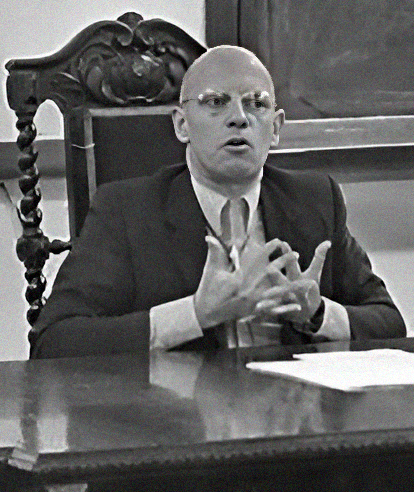Deconstructionism: Difference between revisions
Amwelladmin (talk | contribs) Created page with " <img src="https://upload.wikimedia.org/wikipedia/commons/b/b4/Grabstein_von_Niederdollendorf%2C_R%C3%BCckseite._Cropped.jpg" alt="bla" /> A peculiarly ''French'' strand of post-modernism — leading lights numbering among them Jacques Derrida, Jacques Lacan, Bruno Latour, Jean-François Lyotard, Gilles Deleuze and Julia Kristeva — all pictured with amusing roll neck sweaters, Galois cigarettes and wavby hairdos — “deconstructionists” whose main industry was a..." |
Amwelladmin (talk | contribs) No edit summary |
||
| (2 intermediate revisions by the same user not shown) | |||
| Line 1: | Line 1: | ||
{{a|philosophy|[[File:Michel_Foucault_1974_Brasil.jpg]]}}{{drop|A| | |||
peculiarly ''French''}} strand of [[post-modernism]] — leading lights numbering among them Jacques Derrida, Jacques Lacan, Bruno Latour, Jean-François Lyotard, Gilles Deleuze | |||
and Julia Kristeva — all pictured with amusing roll neck sweaters, Galois cigarettes and wavily bohemian hairdos — “deconstructionists” main industry was attacking existing power structures behind received knowledge, intending to wipe away the power structures and radically reinterpret the world. As such they were indeed historical, backwards-looking, and at the limit, faintly annoying: on their coat-tails came the current crop of grievance studies academics, firmly focussed on shit that has already happened and as such, can’t really be changed so much as just deconstructed and complained about. | |||
{{sa}} | |||
{{gb|[[Post-modernism]]<li>[[Transgressing hermeneutical boundaries]]}} | |||
and Julia Kristeva — all pictured with amusing roll neck sweaters, Galois cigarettes and | |||
Latest revision as of 18:46, 14 October 2024
|
Philosophy
|
A peculiarly French strand of post-modernism — leading lights numbering among them Jacques Derrida, Jacques Lacan, Bruno Latour, Jean-François Lyotard, Gilles Deleuze and Julia Kristeva — all pictured with amusing roll neck sweaters, Galois cigarettes and wavily bohemian hairdos — “deconstructionists” main industry was attacking existing power structures behind received knowledge, intending to wipe away the power structures and radically reinterpret the world. As such they were indeed historical, backwards-looking, and at the limit, faintly annoying: on their coat-tails came the current crop of grievance studies academics, firmly focussed on shit that has already happened and as such, can’t really be changed so much as just deconstructed and complained about.
